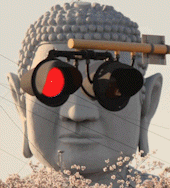Japan's Unique Snow and Intestines Argument
July 21 (Bloomberg) -- Rarely do comments by a central banker cause one to spit out coffee. Bank of Japan Governor Toshihiko Fukui seems to have succeeded. ... Fukui, who's charged with ending deflation, last week said: ``I don't 100 percent trust (imported) economic theories.'' It was during a speech in which he argued for new economic theories tailored to Japanese society, and it's the talk of Tokyo.
The comments were disturbing for two reasons. First, what does Fukui think Japan has been doing these past 20 years? Far from importing international ideas, the world's second-biggest economy ran away from them. All the while its problems have grown larger and so have the costs of fixing them. ...
..Most troubling about Fukui's views is that they fit with Tokyo's muddle-through strategy. Fukui has been viewed as Japan's great hope, an independent thinker who might shake up the nation's tired economic model. His latest comments make him sound like just another Japan apologist. ...
...Japan's policy makers seem to have their own definitions. Economic boom? In Japan, that means 10 years of growth in excess of 0.1 percent. Floating currency? One that falls and makes the economy more competitive. Capitalism? In Tokyo, it means having markets that rise, and only rise.
Jerram calls it the ``snow, intestines and economics argument.'' The reference is to a couple of the more surreal Japanese trade disputes during the 1980s....
Tokyo mulled slapping barriers on imports of foreign skis, claiming Japan's snow was different. Its restrictions on foreign beef imports were based on the contention that Japanese intestines were different. Now Fukui is making a similar point about Japan's economics: it's different, so foreign ideas are no help. ...
| Hot Topics | |
|---|---|
Unique "snow, intestines and economics argument"
8 posts
• Page 1 of 1
Unique "snow, intestines and economics argument"
_________
FUCK THE 2020 OLYMPICS!
FUCK THE 2020 OLYMPICS!
-

Taro Toporific - Posts: 10021532
- Images: 0
- Joined: Tue Sep 10, 2002 2:02 pm
Typical, so typical. Japan is never going to change and only luck will improve its f*ed up economy. 
YBF is as ageless as time itself.--Cranky Bastard, 7/23/08
FG is my WaiWai--baka tono 6/26/08
There is no such category as "low" when classifying your basic Asian Beaver. There is only excellent and magnifico!--Greji, 1/7/06
FG is my WaiWai--baka tono 6/26/08
There is no such category as "low" when classifying your basic Asian Beaver. There is only excellent and magnifico!--Greji, 1/7/06
-

kamome - Posts: 5558
- Joined: Tue Apr 02, 2002 11:50 am
- Location: "Riding the hardhat into tuna town"
Fukui, who's charged with ending deflation, last week said: ``I don't 100 percent trust (imported) economic theories.'' It was during a speech in which he argued for new economic theories tailored to Japanese society..
He's absolutely right. Everyone knows the only thing that will solve all of Japan's economic woes overnight and revitalise the economy back to 1980's levels is if the Hanshin Tigers win this year.
-

Gestalt - Maezumo
- Posts: 101
- Joined: Fri Mar 14, 2003 3:09 pm
- Location: Brizvegas, Australia
cstaylor wrote:Luck has nothing to do with it. Another war breaking out on the Korean peninsula might do it.
Perhaps, but only if a couple of Nodong missiles land on the Diet's doorstep.
YBF is as ageless as time itself.--Cranky Bastard, 7/23/08
FG is my WaiWai--baka tono 6/26/08
There is no such category as "low" when classifying your basic Asian Beaver. There is only excellent and magnifico!--Greji, 1/7/06
FG is my WaiWai--baka tono 6/26/08
There is no such category as "low" when classifying your basic Asian Beaver. There is only excellent and magnifico!--Greji, 1/7/06
-

kamome - Posts: 5558
- Joined: Tue Apr 02, 2002 11:50 am
- Location: "Riding the hardhat into tuna town"
Sounds likle relationship advice, no one heeds it because they keep saying "but my situation is unique" when it is obvious to everyone else that it isn't. And then their relationships fail and everything goes to hell. You listening, Japan?
- Crispy
- Maezumo
- Posts: 727
- Joined: Tue May 07, 2002 4:22 pm
- Location: not Japan for the moment
8 posts
• Page 1 of 1
Who is online
Users browsing this forum: No registered users and 2 guests

